It’s no secret. Long-term friendships provide more than just social connections. Meaningful relationships can boost mental and physical health and even increase life span.
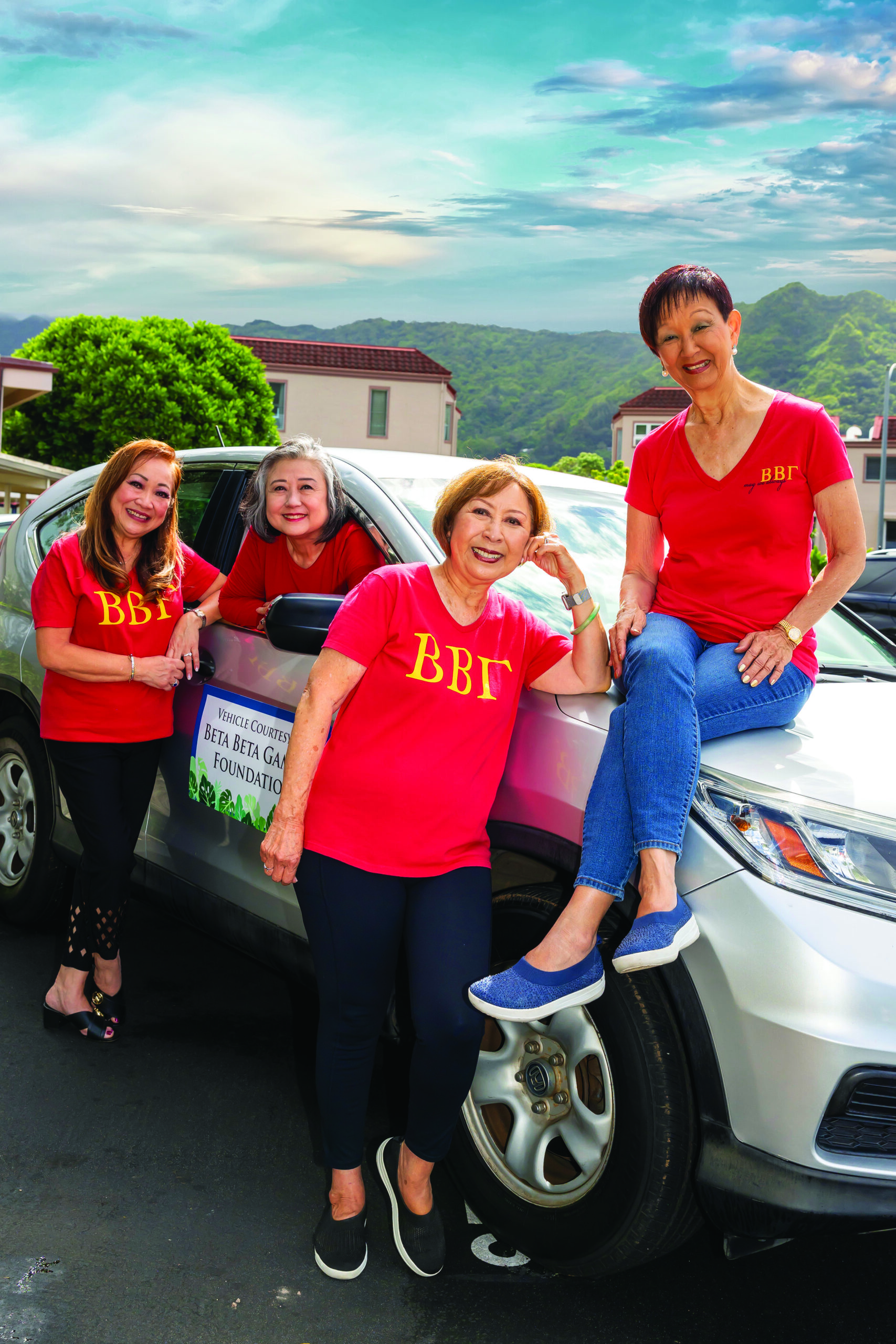
Seen here with one of two Hawaii Meals On Wheels delivery vehicles Beta Beta Gamma Foundation helped purchase, are board members (L-R) Kalene Sakamoto, Wendy Ann Kuwahara, Donna Hoshide and Aileen Shin.
One organization in Hawai‘i, Beta Beta Gamma sorority, has been providing these meaningful life-long connections to women for 75 years.
Ask Donna (Saito) Hoshide about Beta Beta Gamma (BBG) and she will tell you emphatically that it changed the entire trajectory of her life.
Wendy Ann (Kaneko) Kuwahara, credits her more than 50-year involvement with BBG for a deep-rooted base of friendship and support.
Kalene (Shim) Sakamoto cites BBG role models for encouraging her in her career and community service.
All three women now serve on the board of directors for BBG’s charitable foundation. They’ve been actively involved with the organization decades after their college years.
The mention of college sororities may drum up stereotypes of superficial glamour and wild parties, but these women are testament to the deeper experience and benefits sorority “sisterhood” can provide.
Beta Beta Gamma was formally chartered as a sorority in June 1948, back when sororities and fraternities at the UH Mānoa were largely segregated by ethnicity. Its membership was initially Korean, but in the early 1950s, BBG became one of the first sororities at UH to open its membership to all races. In the heyday of campus Greek Life that extended through the 1980s, close to two dozen Hawaii-based sororities and fraternities competed for new members.
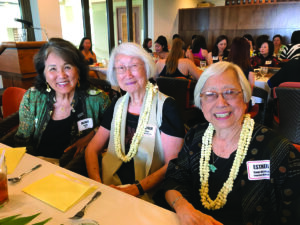
The late Representative Jackie Young (who joined BBG in 1952), and founding members Esther Chun and Esther (Kwon) Arinaga reunite at the sorority’s 70th anniversary luncheon in 2018.
Today, there are only a handful of “Greeks” at the university and BBG is the only remaining local one. How has this organization managed to remain relevant in today’s world, where college students face more pressure than ever to juggle school, work and other responsibilities, leaving little time to commit to extracurricular activities with other groups?
The answer is rooted in the kind of relationships that have kept BBG’s alumnae base engaged for three-quarters of a century.
Life-changing experiences
Back to the life-changing experience Donna Hoshide recounts. When the Hilo native first set foot on campus in 1962, she was intimidated. “Being from a neighbor island, we rarely visited O‘ahu. I’d never even visited the school,” she says. “I didn’t know anyone because all of my friends stayed back to attend Hilo College.”
Thanks to a connection she made in her College of Education classes with BBG member Barbara “Bobbi” (Kong) Takeshita, she eventually pledged for BBG and took a step that opened a whole new world. “I originally thought I would graduate, become a teacher, get married, settle down and start a family right away. That was what was expected back in those days,” says Hoshide.
But one summer, BBG sister Karen Ahn (now a retired state circuit court judge) encouraged her and several others to join her in New York City to work at the 1965 World’s Fair. “That was my first trip to the mainland and after that experience, there was no way I was going to come home and settle down right away. There was so much to do and see,” she marvels. A stint as a Pan Am flight attendant took her around the world for four years, including flying troops out of Vietnam.
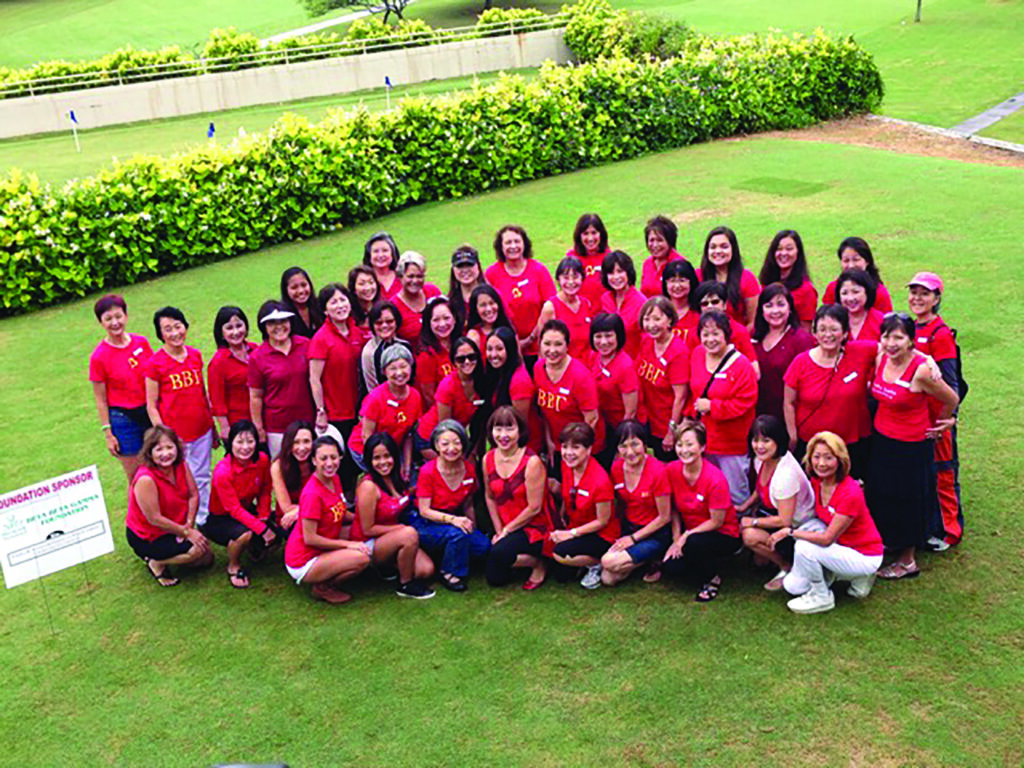 Years later, BBG sister Patricia (Kim) Park’s husband encouraged Hoshide to help with a local political campaign, launching her own career in the political arena. She has since been a committed campaigner for many candidates and worked at the Hawai‘i Legislature and Honolulu City Council, as well as serving as Special Events Coordinator for Washington Place for Governor Cayetano, and as Protocol Officer in Governor Abercrombie’s administration. “I credit BBG relationships and the skills BBG mentors taught me for the life I’ve had,” says Hoshide.
Years later, BBG sister Patricia (Kim) Park’s husband encouraged Hoshide to help with a local political campaign, launching her own career in the political arena. She has since been a committed campaigner for many candidates and worked at the Hawai‘i Legislature and Honolulu City Council, as well as serving as Special Events Coordinator for Washington Place for Governor Cayetano, and as Protocol Officer in Governor Abercrombie’s administration. “I credit BBG relationships and the skills BBG mentors taught me for the life I’ve had,” says Hoshide.
Wendy Ann Kuwahara says BBG has not only provided close friendships and emotional support through life’s ups and downs, but also helped her to grow both personally and as a leader. “I began to take on more responsibility and leadership roles,” she says. “You learn how to interact with so many different personalities and get to know yourself better in how you react to those differences.”
Kalene Sakamoto spent a decade doing postgraduate schooling and working on the mainland. She was concerned about transitioning home after being gone for so long. “So many of my sorority sisters were involved in the community while also balancing professional careers. Their example and encouragement gave me the confidence and the motivation to come home and do the same,” says Sakamoto. “BBG also helped me fulfill a passion to help my community, balancing out my day job in a financially focused business.”
Her involvement has also become a true family affair as her two sisters and their daughters are all BBG members. “My dad even drove my youngest sister to the rushes (recruitment events) to make sure she went.”
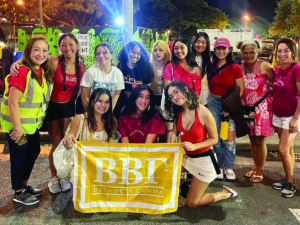
Some of BBG’s newer members join alumnae to volunteer at the 2023 “Night in Chinatown” festival and parade.
Beta Beta Gamma recharged
This commitment to BBG is what spurred alumnae in 1994 to take the lead in reviving the sorority when, like the other campus “Greeks,” its membership faltered and the few remaining active members notified alumnae of potential plans to fold.
“We wanted other young women to reap the benefits of an experience that would carry on throughout their lives,” says Hoshide. A committed group of BBG alumnae, including Hoshide, Sakamoto, Aileen (Kong) Shin, Bobbi Takeshita and others, devoted two years to helping the active membership regenerate BBG. They recruited new members by contacting high school counselors and other BBG sisters to publicize BBG’s benefits and diving in to plan and host rushes in their homes.
“We recognized that times had changed. While many of us were initially drawn to BBG for the social relationships and grew to appreciate the deeper benefits over time, students now had less time and were more career-focused from the start,” Hoshide notes. “We demonstrated the value of networking with our many accomplished alumnae who could serve as mentors or offer internships. Sisters such as attorney Coralie Chun Matayoshi shared how to balance sorority and academic life and the many values to be gained in both their personal and professional lives.”
Jordan Humphrey, who joined BBG in 2019 and remains active on campus as she pursues a master’s degree in clinical psychology, attests to that experience. “BBG definitely helped me get out of my shell and realize my potential,” she says. “Holding positions on the executive board gave me confidence that I could be a leader and live up to those high standards, standards that we expect in the sorority and that the alumnae expect from us.” The California native adds, “I’ve learned so much from our community service work, especially about Hawaiian culture. Coming from the mainland, I think it’s so important for people to respect the local culture and values.”
Cementing a legacy of community service
Not only did the alumnae successfully revive the active sorority on campus, but the experience also crystallized BBG’s desire to take its long history of community service to the next level.
In 1997, BBG sister Patricia (Chikamoto) Lee lost her courageous battle with cancer and fellow member Diana (Shibata) Tung proposed the idea of organizing a charity golf tournament in her honor. This culminated in the establishment of the Beta Beta Gamma Charitable Fund with the Hawaii Community Foundation in 1998. It later became the Beta Beta Gamma Charitable Foundation, receiving official Internal Revenue Service 501(c)(3) approval in 2000.
The charitable foundation has galvanized the alumnae base more than ever.
For 20 years until 2018, an army of BBG volunteers led by Tung and later Shin hosted its popular golf tournament to raise funds for the charitable foundation. With a reputation for premium hospitality including extra touches like homemade baked goods and snacks, the annual tournament revived connections with alumni from other fraternities and sororities and most importantly, with BBG alumnae of all ages. “It has meant so much to me getting to know sisters from all the years, not just from my time,” says Kuwahara, who now serves as president of the charitable foundation. “That’s what’s so special about this network. It’s so diverse, in backgrounds and ages. Everyone has something to contribute.”
Other fundraisers, including dances and a recurring Wine & Dine event, have added to the charitable foundation’s endowment. Aided by a vast network of support from alumnae, local companies and other partners, BBG’s charitable foundation has awarded more than 100 grants and scholarships totaling almost $500,000 to date.
The scholarships especially resonate with BBG alumnae. It is an opportunity to fulfill one of the sorority’s long-time goals of helping young women pursue their education while providing exposure for the sorority on campus. Scholarship recipient Joanne Allagonez was grateful to receive a scholarship in 2006 when she gave up full tuition offers at other schools to go to UH at Mānoa because it offered her speech pathology and audiology major. It also piqued her interest in BBG, which was validated by the warm scholarship interview she had on Hawai‘i Island with two BBG sisters who joined almost 40 years earlier.
“It was more like a talk story session and I really noticed their closeness even after all these years,” says Allagonez. “I was very active in community service and excited to learn about BBG’s community involvement.” She went on to join BBG, was active while pursuing both her undergraduate and graduate degrees, served asits president, and today is vice president for its charitable foundation. “It’s great to work with women of different skills and strengths from all years toward a common goal of community service,” she adds. “And it’s so fulfilling when we get to see the results of the hard work.”
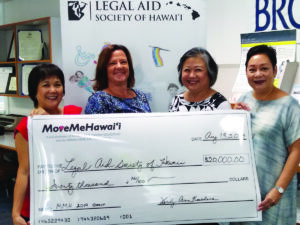
Beta Beta Gamma and the Hawaii State Bar Foundation awarded more than $70,000 to nonprofits like The Legal Aid Society of Hawaii as part of their joint MoveMeHawai‘i community education and fundraiser in 2019. (L–R): Cheryl Kakazu Park, Angela Lovitt (Legal Aid Society of Hawaii), Wendy Ann Kuwahara, Lynne Toyofuku (Hawaii State Bar Foundation).
Raising the bar: Social justice and community unity
BBG’s charitable foundation does more than fundraise for worthy causes. Led by board member Vanna (Ishimaru) Novak, it has offered seminars on topics such as job interviewing. It has also amplified its impact by offering other community education programs. BBG formed an umbrella program called MoveMeHawai‘i with the goal of educating the public about social justice issues, promoting community unity, and supporting organizations that provide legal or social services to the underserved.
Since 2019, BBG Foundation board member and attorney Cheryl Kakazu Park has chaired the MoveMeHawai‘i programs. They include, in partnership with the Hawaii State Bar Foundation, screenings of the award-winning documentaries “And Then They Came for Us” and “Alternative Facts: The Lies of Executive Order 9066” and panel discussions that drove home poignant lessons from the forced incarceration of individuals of Japanese ancestry during World War II and the importance of protecting the rights of those of any ancestry. “By highlighting these lessons and how they relate to the ongoing social injustices faced by minority groups, we hope to ‘move’ people by increasing awareness or motivating them to get personally involved or support organizations that are working for these causes. That’s where the name ‘MoveMeHawai‘i’ comes from,” says Park. “We hope that sharing these stories brings the community together. The MoveMeHawai‘i program also enables BBG to collaborate with others to expand our network, increase our impact, and remain relevant in a changing world.”
 In 2021, MoveMeHawai‘i funded and coordinated the production of “Faces of Courage: Untold Stories of World War II Filipino Veterans”. The documentary, produced by Alex Bocchieri, highlights the struggle for equity by Filipino veterans who fought side by side with Americans during World War II. Produced in collaboration with nonprofit Filipino Veterans Recognition and Education Program (FilVetREP), the program examined the decadeslong effort to obtain the benefits and recognition promised to these heroic veterans. The film debuted in 2021 on Veterans Day on the Hawaii News Now network. Net proceeds raised were donated to FilVetREP for itsongoing educational program. MoveMeHawai‘i also coordinated a pilot program to introduce the film and FilVetREP’s related curriculum in several Hawai‘i public schools, funded DVDs for the schools and all public libraries, and continues to make the documentary available through the website MoveMeHawaii.org.
In 2021, MoveMeHawai‘i funded and coordinated the production of “Faces of Courage: Untold Stories of World War II Filipino Veterans”. The documentary, produced by Alex Bocchieri, highlights the struggle for equity by Filipino veterans who fought side by side with Americans during World War II. Produced in collaboration with nonprofit Filipino Veterans Recognition and Education Program (FilVetREP), the program examined the decadeslong effort to obtain the benefits and recognition promised to these heroic veterans. The film debuted in 2021 on Veterans Day on the Hawaii News Now network. Net proceeds raised were donated to FilVetREP for itsongoing educational program. MoveMeHawai‘i also coordinated a pilot program to introduce the film and FilVetREP’s related curriculum in several Hawai‘i public schools, funded DVDs for the schools and all public libraries, and continues to make the documentary available through the website MoveMeHawaii.org.
“We’re forever grateful to the BBG Foundation for helping us tell the Filipino veterans’ story,” says Will Tungol, director of FilVetREP’s Hawai‘i region, adding that “It meant a lot that they cared enough to help us increase awareness well beyond our Filipino community.”
The foundation has also signed on as a cosponsor for the TV airing this fall of “Removed by Force: Eviction of Hawai‘i’s Japanese Americans During WWII”. The documentary was produced by filmmaker Ryan Kawamoto with support from the Honolulu Japanese American Citizens League (JACL), and several local companies. It memorializes the relatively unknown cases of about 1,500 Hawai`i American Japanese who were not interned, but forcibly removed from their homes, farms, and
businesses during the war. The film also focuses on the successful efforts of the Honolulu JACL and the National Asian Pacific American Bar Association to seek redress compensation from the U.S. Department of Justice.
A legacy to be proud of
This year, as Beta Beta Gamma sorority marks its 75th anniversary and its charitable organization celebrates its 25th year with a big reunion event in October, the BBG sisters are taking a moment from the flurry of all this activity to reflect on what the organization has meant to all of them.
“I’m so proud of everything we’ve accomplished,” says Kuwahara. “The bonus is that we’ve been able to do it together. I can volunteer for many community causes, but it means so much more personally that I get to do this with my BBG sisters. It’s a lot of work, but whatever time you put in, you get back tenfold.”
Sakamoto agrees. “Staying connected with these women while being involved in things I’m passionate about helps me so much physically, mentally and emotionally. It gives me such a sense of fulfillment,” she says.
Beta Beta Gamma sorority cites core pillars of Sisterhood, Community, Knowledge and Leadership and sums itself up with the tagline “Individually unique. Together complete.” And for the past 75 years, it has succeeded in living up to those expectations.
BETA BETA GAMMA FOUNDATION (501(c) 3 nonprofit)
bbgfoundation.org
To donate: bit.ly/BBGFoundation_Donation
Sorority Sisterhood: betabetagamma.com

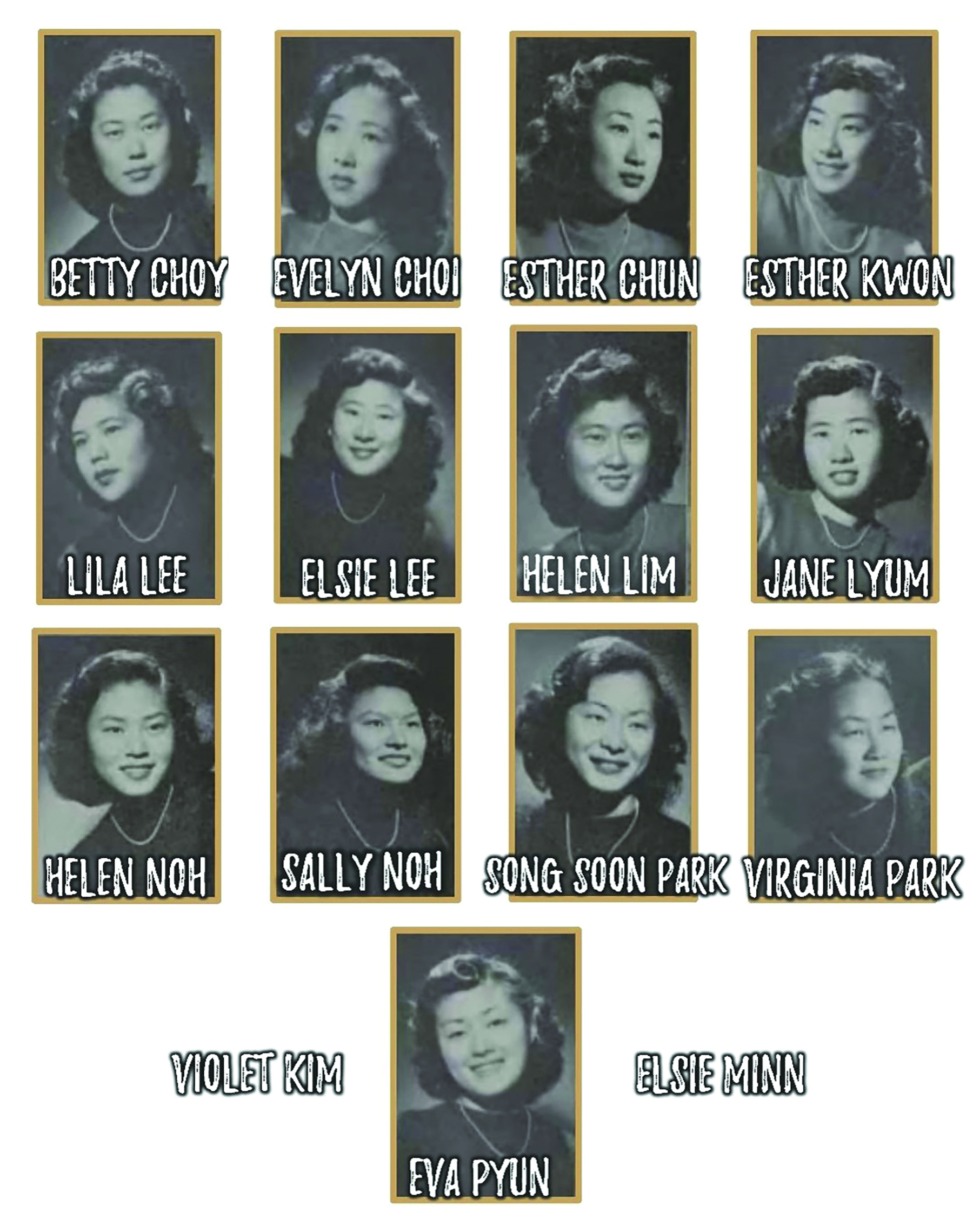
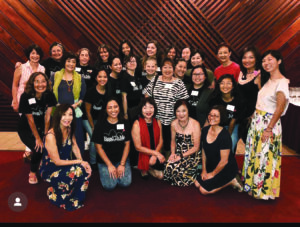

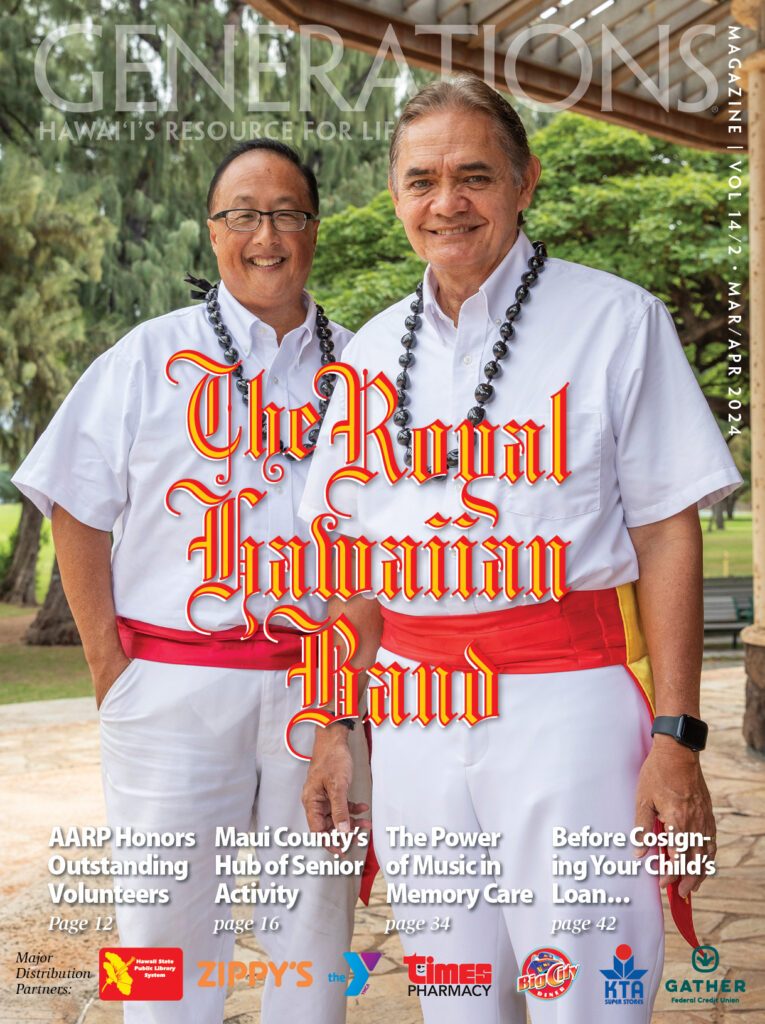
Trackbacks/Pingbacks